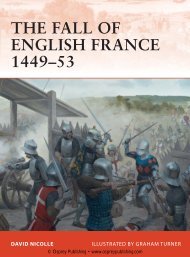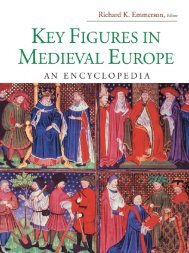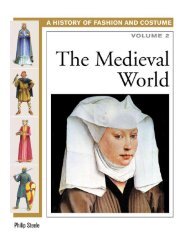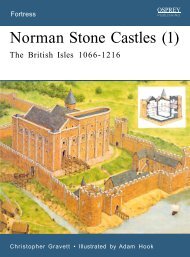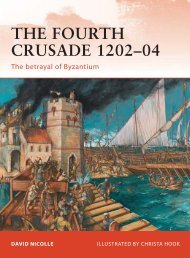Osprey - General Military - Knight - The Warrior and ... - Brego-weard
Osprey - General Military - Knight - The Warrior and ... - Brego-weard
Osprey - General Military - Knight - The Warrior and ... - Brego-weard
Create successful ePaper yourself
Turn your PDF publications into a flip-book with our unique Google optimized e-Paper software.
<strong>The</strong> distinction between the 'marshal of the realm' <strong>and</strong> the 'marshal of the host' is<br />
an important one. In Engl<strong>and</strong> the titles of constable <strong>and</strong> marshal were held by<br />
hereditary right. <strong>The</strong> privilege was jealously guarded. It was the basis for the argument<br />
between the earls of Hereford <strong>and</strong> Gloucester at Bannockburn; the former held the<br />
hereditary title of constable of Engl<strong>and</strong> but Edward II appointed his nephew the Earl<br />
of Gloucester as constable of the army, <strong>and</strong> the men quarrelled over who had the right<br />
to lead the vanguard.<br />
In France the ranks of marshal <strong>and</strong> constable, along with that of the 'master of the<br />
king's crossbows', were permanent positions within the royal household. <strong>The</strong> constable<br />
was effectively the king's military lieutenant, with responsibility for the organization<br />
of royal armies, supported by the two marshals. <strong>The</strong> master of the king's crossbows<br />
seems to have had authority over all of the foot troops in royal armies, not just the<br />
archers. In all cases the men appointed to the positions seem to have been experienced<br />
<strong>and</strong> capable. Charles V gave the office of constable to Bertr<strong>and</strong> du Guesclin, a Breton-<br />
born knight whose military abilities had brought him to the king's attention. That he<br />
had difficulties asserting his authority over the greater nobility is indicative of the<br />
aristocracy's proprietorial feeling about military comm<strong>and</strong>.<br />
Beyond the ranks of marshal <strong>and</strong> constable, <strong>and</strong> the French master of the<br />
crossbows, there are very few examples of formal ranks, <strong>and</strong> given the impermanence<br />
of medieval armies, this is unsurprising. It would appear that when leadership of<br />
specific units or special tasks was required an ac) hoc appointment was made from<br />
amongst the attendant noble <strong>and</strong> knightly ranks. When the English army formed for<br />
battle against the French at Agincourt in 1415, for example, Henry V appointed the<br />
58-year-old Sir Thomas Erpingham (who had been Marshal of Engl<strong>and</strong> between 1404<br />
<strong>and</strong> 1405) to comm<strong>and</strong> the archers.<br />
Whilst experience <strong>and</strong> knowledge were key factors in the choice of comm<strong>and</strong>ers,<br />
social position <strong>and</strong> political considerations also had a part to play. Even when an army<br />
was led by a king or prince of royal blood the greater nobles serving under him felt<br />
they had the position <strong>and</strong> right to be involved in any decision-making. Comm<strong>and</strong> could<br />
be collegiate, with many of the key martial decisions being made by a council of war.<br />
Narrative sources recount the debates that took place in such councils <strong>and</strong>, although<br />
such reported speech should not be taken at face value (chroniclers being fond of<br />
writing what men should have said rather than their actual words), they suggest<br />
something of how such councils might have run <strong>and</strong> certainly how contentious they<br />
could be. Before Courtrai the great nobles within the French army gathered together<br />
to discuss how the battle should be fought. <strong>The</strong> constable, Raoul de Nesle, warned of<br />
the danger of a mounted charge across the streams, <strong>and</strong> the master of the king's<br />
crossbows, Jean de Burlats, argued for an attack by the footsoldiers, a proposition



